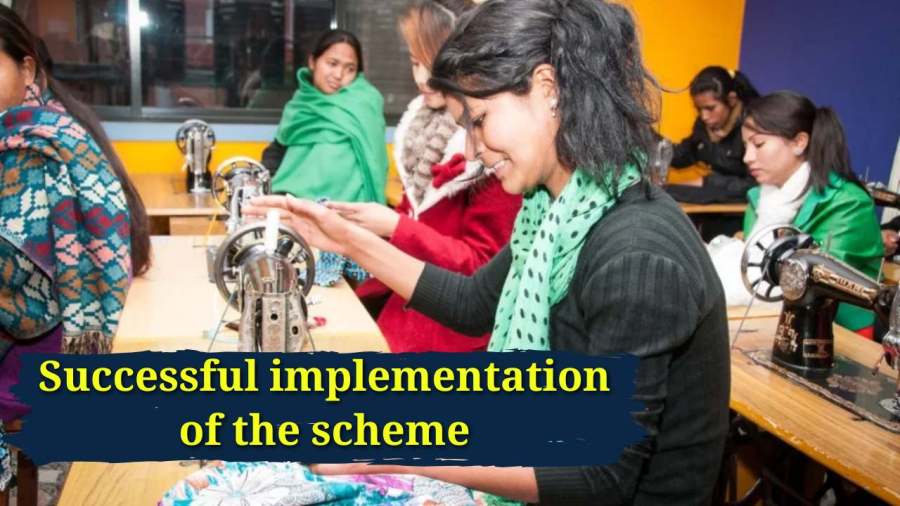In India, where a large portion of the population lives in rural and semi-urban areas, government and non-government initiatives aimed at promoting self-employment play a vital role in socioeconomic upliftment. One such initiative is the Tailoring Machine Scheme, which is designed to empower women, particularly from economically weaker sections. This scheme provides free or subsidized sewing machines to help individuals start their own tailoring businesses from home.

Background and Purpose of the Scheme
The Tailoring Machine Scheme, often introduced by both central and state governments, has a key objective: to provide self-employment opportunities for women, widows, and economically weaker individuals. By equipping them with a sewing machine, they are enabled to generate a sustainable income. The scheme also aligns with broader national objectives such as women empowerment, poverty reduction, and rural development.
Eligibility Criteria
While the criteria may vary from state to state, the general eligibility conditions under the scheme include:
- Age Limit: Applicants are generally required to be between 20 to 40 years old.
- Gender: Preference is typically given to women, especially widows and disabled individuals.
- Income Limit: Family income should generally be below a certain threshold, often Rs. 12,000 per annum or as specified by the respective state authority.
- Residence: The applicant must be a permanent resident of the concerned state.
- Documentation: Basic documents like Aadhar Card, income certificate, domicile certificate, and passport-sized photos are usually required.
Application Process
The application process for the tailoring machine scheme is relatively straightforward:
- Offline Application: Beneficiaries can visit the nearest government office, such as the District Industrial Centre (DIC), Women and Child Development Office, or the Village Panchayat.
- Online Registration: In some states, online portals are available for registration. Applicants can fill in the required form, upload documents, and submit the application digitally.
- Verification and Distribution: After successful document verification, sewing machines are distributed to eligible candidates, sometimes in public events conducted by local authorities.
Implementation Partners
The successful implementation of the scheme often involves collaboration between:
- State Governments
- Local Self-Government Bodies
- NGOs and Self-Help Groups (SHGs)
- Social Welfare Departments
- Skill Development Missions
In many cases, training in tailoring is also provided free of cost along with the machine, ensuring that recipients are not only equipped with tools but also with the skills needed to use them effectively.
Benefits of the Scheme
- Financial Independence: Women gain the ability to earn an income, which contributes to their personal empowerment and household economy.
- Home-Based Work: Tailoring can be done from home, allowing women to balance household responsibilities with work.
- Skill Utilization: Those who already have tailoring skills can immediately start their business.
- Low Investment: With the main equipment provided, the entry cost for starting a tailoring business is minimal.
- Community Development: It boosts micro-entrepreneurship in villages and small towns.
Real-Life Success Stories
Several women across India have changed their lives through the Tailoring Machine Scheme. For instance, in some rural districts of Karnataka, women who received sewing machines under government schemes are now running small tailoring shops and training others. In many cases, their monthly income has risen significantly, helping them educate their children and support their families.
Challenges Faced
Despite the benefits, certain challenges persist:
- Lack of Awareness: Many eligible individuals remain unaware of the scheme’s existence.
- Insufficient Training: Not all schemes offer training, which can limit the machine’s utility for complete beginners.
- Irregular Distribution: Delays and irregularities in machine distribution can affect the program’s credibility.
- Market Linkage: Lack of access to markets for selling tailored garments remains a barrier to scaling up the business.
Government Efforts to Improve
In response to these challenges, governments are:
- Increasing awareness through Anganwadi workers and local advertisements.
- Integrating skill development modules under schemes like the Pradhan Mantri Kaushal Vikas Yojana (PMKVY).
- Supporting SHGs and women’s collectives to form tailoring units.
- Providing access to microcredit through banks and cooperative societies.
Conclusion
The Tailoring Machine Scheme is a powerful tool for grassroots development. By enabling women and marginalized communities to become self-reliant, it not only promotes individual empowerment but also fosters rural economic growth. With better implementation, greater awareness, and access to markets, the scheme has the potential to transform countless lives across the country. Going forward, integrating training and market access with the scheme could ensure its long-term success and wider impact.
